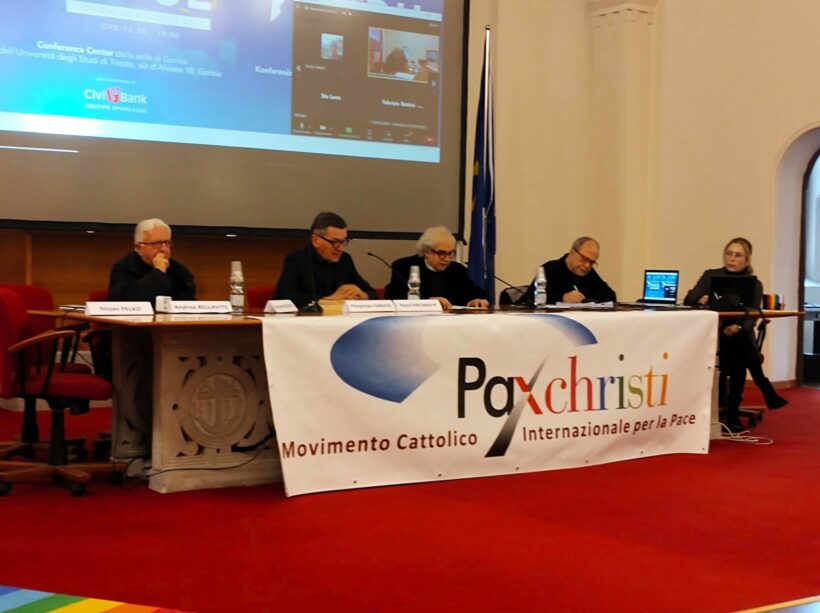Document after the first day of the Gorizia/Nova Gorica Conference “Negotiating Peace” (30 December 2023), the end-of-year appointment of Pax Christi Italia with the Permanent Committee for Peace of Gorizia and Nova Gorica. (Translator’s note: Nova Gorica in Slovenia and Gorizia in Italy have applied to be the European Capital of Culture in 2025, as twin cities.)
The Civil Peace Corps represents an overall proposal of civil society for the prevention and fight against war, for the realization of people’s diplomacy, and for the promotion and construction of peace. They inherit and make their own a long tradition of thought and practice of civil society and popular movements for peace, human rights, and nonviolence, from the Gandhian-inspired Shanti Sena to the World Peace Brigades, from the White Helmets to the promise, inspired by Alex Langer and others, of European Civil Peace Corps.
Documents and experiences capable of inspiring the paths of our time refer to them: starting from the Agenda for Peace (1992) of the Secretary General of the United Nations Boutros-Ghali, with the definitions of peace-keeping, peace-making, peacebuilding, and preventive diplomacy, and therefore the numerous and very rich experiences of interposition and peace mediation of civil society, from the peace marches in the former Yugoslavia to the experiences of nonviolent interposition in conflicts, from the experience of Peace Embassies in conflict zones, in particular in Iraq and Kosovo, to the most recent experiments for Civilian Peace Corps.
The Civil Peace Corps is a powerful instrument of civil, non-armed, and non-violent commitment, “on” and “in” conflicts: a tool for acting “on” conflicts, studying and interpreting them, understanding their modern methods of articulation and intervening “in” conflicts, to contain their dynamics, prevent their escalation, prevent their onset, initiate their transformation, overcome them in the sense of building peace.
As civil society organizations have repeatedly experienced in their projects, not only does the intervention take place within the framework of a plan shared in all its phases with local operators, but it can only materialize upon a “legible request” from part of the operators of the destination contexts, who therefore activate and materialize the request for an intervention that takes place in support of local peace actors in their commitment to de-escalation, human rights, and peacebuilding.
Consistent with these premises, the Civil Peace Corps can develop collaborative relationships in the civil sphere with other civil society organizations as long as these have chosen a mode of action sincerely inspired by the values of peace and human rights, while at the same time showing a potential of positive impact on the conflict, for its management, solution and non-violent transformation.
Conversely, as regards the military sphere, «with armed actors – regular and non-regular – no forms of collaboration or synergy or an armed escort are permitted; there can be dialogue aimed at the nonviolent management of the conflict or exchange of security information, where this does not jeopardize the nonviolent legitimacy of the mission, in terms of methods of action and reception by the parties”, as highlighted in the document on “Identity and criteria of Italian Civil Peace Interventions”, developed in 2011 by the Civil Peace Interventions Table.
In the field, therefore, collaborations can be activated with other civil society entities, agencies of international organizations, and public institutions, only if such relationships do not undermine the independence and impartiality of the mission.
As the realities of civil society have often been able to materialize in their activities and projects for the prevention of violence and the construction of peace, it is a question of being as “neutral as possible concerning the parties in conflict, but never neutral in the face of large violations of human rights”, having as a compass the United Nations Charter, the Universal Declaration of Human Rights, the founding principles of international law and justice and relying on solid and effective training and preparation.
The Civil Peace Corps is a mode of civil, non-armed, and non-violent intervention, implemented by teams of civilians, professionals, and volunteers, who as third parties support local actors in the prevention of violence, in the management and transformation of the conflict, in peacebuilding.
The commitment of civil society, in the context of the activation of Gorizia and Nova Gorica as European Capital of Culture 2025, can therefore fuel and renew the proposal to transform Nova Gorica with Gorizia into a true epicenter of development and training for Civil Bodies of Peace and in perspective and with other realities on the national and international scene, in a true planetary laboratory of peace and justice.
It is more appropriate than ever, in this sense, to relaunch a path, within the framework of Gorizia and Nova Gorica, the European Capital of Culture, aimed at the construction of a real «International development and training center for Civil Peace Corps». As in the best experiences developed in this sense, starting from a strong local rooting, capable of conveying consensus and participation around the contents of the proposal, the aim is to promote a fruitful convergence between entities, scientific and academic institutions, organizations, and networks of civil society, to develop the two directions of this commitment: an international Center, based in Gorizia and Nova Gorica, for the training of operators of the Civil Peace Corps and the development of analyzes, and tools for the prevention of violence and the positive transformation of conflicts.










